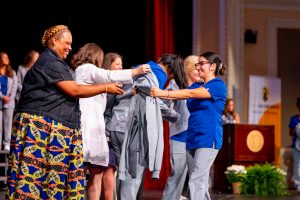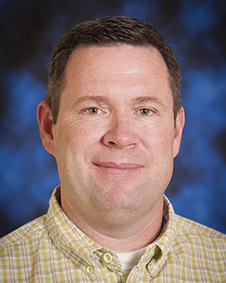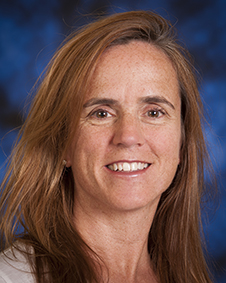
The Advising Center is here to provide support and guidance for all nursing students, both undergraduate and graduate. The Advising Center is open from 8 a.m. – 5 p.m.
Advising Center staff provide initial advising consultation to new and prospective students. Once students have been admitted to the Upper Division, each is assigned an individual faculty advisor. The Advising Center coordinates faculty advisors and also provides supplemental support to students who have been assigned a faculty advisor. Advising Center staff and faculty advisors greatly care about our students, their success at UNCG and their connection to the University.
Connect with an advisor

Philip Simpson
Director of Student Success
294G Nursing and Instructional Building
Phone: 336-334-5288
Email: pasimpso@uncg.edu
Advisor/Student Success Coordinator
294D Nursing and Instructional Building
Phone: 336-334-4686
Email: bsflanag@uncg.edu
FAQs
A. Nursing is an upper division major in the junior and senior years, and students are admitted through competitive application. Click here to explore the criteria to be a pre-nursing major.
Every year the School receives more applications to the upper division major than can be accepted, and students need to demonstrate strong academic performance to have a high likelihood of being accepted into the major.
A. For the nursing degree, college level foreign language is NOT required. If a student is admitted with a language deficiency, however, the student must complete study of a foreign language through the 102 level. A language deficiency means that the student did not complete the minimum amount of high school foreign language, which is two years of the same foreign language. To remove a language deficiency, a student could return to take high school language, or take language at a community college, or take the necessary course(s) at UNCG. Thus, a student who chooses to remove the language deficiency at UNCG would have to take college-level foreign language. If you have a language deficiency you were notified in your letter of admission, and you need to talk with the nursing advisor. It is rare for a recent graduate of a North Carolina public high school to be admitted with a language deficiency.
A. Advisors serve several roles for students. One important role is checking to see that students have planned an appropriate course schedule: the right courses, prerequisites met, and in the suggested sequence. Because the nursing curriculum has so many requirements, student who go too far “off track” with their requirements may need summer school or an extra year to finish. Advisors also serve as role models. They can tell students about working as a nurse, different career options in nursing, how to choose a first job, and answer many questions about nursing and nursing school.Advisors also know who students can contact about tutoring, writing skills, study skills, test anxiety, or other needs that some students may have. Faculty advisors can serve the role of “sounding board” for questions and issues students may have.
A. Yes. Students who wish to pursue a minor certainly may do that, and the requirements for various minors are described in the Undergraduate Bulletin, in the section for each department. However, because a minor typically requires 15 to 18 semester hours of course work in the selected area of study, pursuing a minor usually means the student requires an extra semester or year to graduate. Students thinking about this should talk it over with their advisors.
A. If you are admitted to the upper division major, you will be required to take classes (NUR 210 and 220) the summer before your junior year. The School of Nursing does not require summer school for pre-nursing students. However, some pre-nursing students choose to attend summer session, in order to lighten their academic load during the regular academic year. Students should talk over this decision with the advisor. Courses taken elsewhere can be transferred to UNCG as hours toward the degree, but will not change the UNCG grade point average. However, when you apply for admission to the upper division the application requires that you attach copies of transcripts of all post-high school education, so the Admission Committee will consider your grades in the courses you completed elsewhere in making their admission decision. Please ask your advisor about this prior to taking courses elsewhere, to avoid inadvertently taking a course that does not transfer or does not fill a requirement you are trying to fill.
A. There are more applicants to the Upper Division than can be accepted. Because admission cannot be guaranteed, students are encouraged to think through their options in the event they are not accepted to the Upper Division. There are three basic options for students who are not accepted: 1) Stay at UNCG and apply again the next year; 2) Stay at UNCG, but change majors; 3) Transfer to another nursing program. Students who apply to other nursing programs must contact each school for information about prerequisite requirements and application deadlines. Students should talk with their advisors to better understand their likelihood of being admitted, discuss career options, and learn about campus resources.
A. The Financial Aid Office has the answers to financial aid questions. However, you need to know that if you are on financial aid, you must maintain a minimum GPA to qualify for aid in each semester. In addition, there are rules about how many hours you must complete to remain eligible for aid. The following paragraph comes from the Financial Aid website: “Each semester (Fall, Spring and Summer) a student (undergraduate or graduate) must earn a minimum of 75% of the hours registered for at the end of the schedule adjustment period, also known as Drop/Add (usually 5 days into a semester, check the University Bulletin for specific dates for specific semesters). For example: if a student had 12 hours at the end of schedule adjustment then the student would have to earn at least 9 hours to remain eligible for further financial aid (12 x .75 = 9).” This is part of the “Satisfactory Academic Progress” (SAP) Policy. For other financial aid information, go to the UNCG Homepage: www.uncg.edu. Choose either Prospective or Current Student from the list on the left, and go to the Financial Aid Office.
A. The official evaluation of transfer credits will be completed after your application for admission to the University is complete. There are some online resources that you can use to see if the courses you completed will transfer. For NC community college course, click here. For students from four-year schools, click here. Only transfer courses with grades of C or higher will be considered for transfer; a grade of C- or lower will not transfer. If you see that a course you have completed transfers as 000, do not be alarmed. For example, a combined anatomy & physiology course will transfer to UNCG as BIO 000 or BIO elective. This is because we do not have a combined A & P course, so there is not an equivalent course number to assign to that course. The credit earned (assuming it was a grade of C or better) will apply toward the degree. If you are unsure if the course will meet a School of Nursing requirement, contact the School of Nursing to check with us. You will start a new GPA at UNCG when you begin here. However, when you apply for admission to the upper division the application requires that you attach copies of transcripts of all post-high school education, so the Admission Committee will consider your grades in the courses you completed elsewhere in making their admission decision.
A. The NC General Assembly has imposed a 50% tuition surcharge on students who take more than 140 credit hours toward a baccalaureate degree. Courses taken during summer school and credit by exam do not count toward the surcharge.
A. Study abroad is enriching and a wonderful opportunity for students. However, a student who plans to complete the program in four years could only spend a full semester abroad before entering the major, or during the summer. However, the School of Nursing sometimes has short-term study abroad opportunities for students in their senior year.
A. The prerequisite courses can be completed on a part-time basis, but the upper division major requires full-time enrollment.
A. Yes. In North Carolina, the course numbers are listed in the table below:
| Community College course numbers | School of Nursing accepts the course for: |
|---|---|
| BIO 165 & BIO 166 (must complete both courses) Anatomy and Physiology I & II |
Anatomy and physiology courses |
| BIO 168 & BIO 169 (must complete both courses) Anatomy and Physiology I & II |
Anatomy and physiology courses |
| BIO 175 & BIO 176 or BIO 275 | Microbiology course |
| MAT 151, 152, or 155 | Statistics course |
Students from outside of North Carolina should check here or contact the Registrar’s Office at (336) 334-5946 to confirm that courses will transfer.
A. Once you are admitted, an email will be sent to you with instructions for registration. You also may explore information at the Graduate School website and the Registrar’s website.
A. A graduate faculty member in the School of Nursing will be assigned to advise you when you are admitted to the program. Additionally, the Director of Graduate Study in the School of Nursing can answer questions for you.
A. The class schedule is found by going to http://www.uncg.edu. Select the UNCGenie icon located at the very top right of the page (it looks like a genie lamp). You will be guided to the UNCGenie Homepage. Click on Class Schedule, then choose the term and in the subject box, type Nursing. You will then see the list of courses offered for the term you chose. You can explore their meeting times and locations.
A. Once you are admitted, an email will be sent to you with instructions for registration. You also may explore information at the Graduate School website and the Registrar’s website.
A. This varies. Some courses may be offered in specific semesters, including only in the summer, and may or may not be online. Explore the course catalog and reach out to your advisor for more information.
A. The PhD in Nursing is designed to produce a nurse scientist who will conduct research in nursing and generate new knowledge. The DNP is designed as a practice doctorate for those who wish to engage in advanced nursing practice guided by evidence. See http://www.aacn.nche.edu/dnp/ContrastGrid.pdf.
A. If your master’s GPA is 3.2 or greater you do not need to take GREs. If your master’s GPA is lower than 3.2 please contact the Director to discuss.
A. The plan of study options are 6-hour and 9-hour. The 6-hour plan is part-time and will take four years to complete. The more intense 9-hour plan can be completed in 3 years. It is difficult to work and carry 9 hours of course work. It is possible to take fewer than 6 hours per semester, but it is difficult to complete the program within the limit of 7 years.
A. Yes, your Master’s degree in nursing from an accredited program is required for admission to the PhD program.
